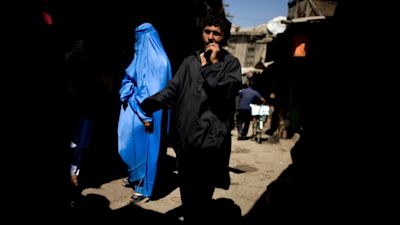Afghanistan's women journalists, doctors and lawyers reveal reality of life under Taliban

Video report by ITV News Correspondent John Ray
Women in Afghanistan who worked as journalists, doctors, lawyers and civil servants have spoken of losing their dreams, freedom and independence after the Taliban took over the country.
One month after the nation's capital, Kabul, fell to the hands of the insurgents, the women who vanished from offices and TV screens have told ITV News about the reality of life under the Taliban.
Many remain hidden, but a brave few from across the country have chosen to speak out about their plight. All the women who spoke to us have been kept anonymous for their safety.
One TV reporter who used to work out in the field said Taliban fighters prevented her from entering her office building on the second day they came to power. She was told she was not allowed to continue her work as a journalist.
She said: "The first day that they came to power, they announced that there would be no discrimination against women and women would be allowed to continue their work and their jobs. Unfortunately, the Taliban did not fulfil any of their promises.
"Right now, I stay at home and I am totally sad and depressed because I cannot continue my job as a journalist. In these days I am always thinking about how I can save my life."
Another, who held a senior government role, described the hopelessness of only being able to sit at home and watch a "government of masculinity".
She said the Taliban had announced they "no longer have trust in (women's) capabilities" to work.
She said while men still retain their freedoms, "women are actually left vulnerable. Women are actually left helpless".
She continued: "And in order to receive back all those achievements that we achieved until August 15, we need support.
"We need the whole world to hear our voices and to work with us together to convince the Taliban to let us go back to work."
A women's organisation director, who used to campaign against violence against women, has now fallen victim to it herself.
She told ITV News: "Helping was giving me a meaning for life.
She continued: "Now, nothing. We are nothing. And we have nothing now."
Speaking about what she missed most, she said: "Having salary, having a normal life, shopping, going out of and going in other cities, travelling, having plans, having goals are the amazing things of life. We'll miss it in Afghanistan now."
She said "the most precious thing" was her ability to help others, and without that, she said she feels like she is "suffocating".
But she says she more worried about losing her loved ones than dying herself.
A lawyer who headed her own firm said she used to defend people's rights, especially that of women. She even set up her own charity to help those who were deprived.
Now, she says, she cannot even go out of her home. And the one time she did because of a toothache, she went to the doctors dressed completely in black and "with fear".
She said: "I loved my job very much, I loved my job and now I cannot work and I even lost my personal freedoms. I can no longer even cover my clothes to my liking.
"These are painful for me.
The lawyer has her own traumatic experience from the first Taliban rule which hasn’t left her.
"Although I was a seven-year-old child, I went to buy bread one day when a group of Taliban beat me for covering my appearance, which I still feel.
"I do not want a seven-year-old girl to experience this pain again. Our future is very uncertain."
The Taliban have let one group of women continue to work - doctors and medical staff - but only if they cover up completely and even these women face a huge challenge.
But the lawyer says one of her sisters, who is a doctor, is at home out of fear due to being forcibly taken away by the Taliban several times to treat their patients.
Another doctor explained there were issues with pay: "We used to have our salaries paid on time, access to the right equipment and medications. In the space one month this has all been changed.
"Our funds and salaries have all stopped. My children's future has been ruined; they can no longer access the right education."
Despite the risks, one activist is continuing to protest for women's rights.
She said: "Our elite women folks are missing, they are not seen in offices, on TV screens and this is due to the fear they have for their lives. This is a big loss and concern for us.
"Previously we had a large number of women government employees and in leadership positions, now they are all at home or in self-exile."
Women in Afghanistan have taken to the streets of the capital in recent weeks, protesting against the Taliban.
Taliban fighters have turned on the demonstrators, however, with shots fired into the air to disperse the crowds.
On social media women are campaigning too - the hashtag #DoNotTouchMyClothes is an online campaign from Afghan women around the world, sharing photos of themselves in traditional colourful clothing.
The women we spoke to says more is needed, though, and called on the wider world for help.
Pakistani female education activist Malala Yousafzai told CBS News this week the US has a "huge responsibility" to the women of Afghanistan who lost their freedoms after the Taliban took over following the withdrawal of US troops.
She urged US President Joe Biden to "stand up and support the rights of women in Afghanistan and stand up for girls education".